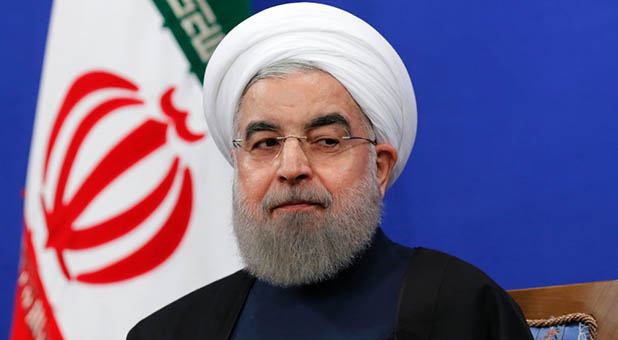Iran: The Bad and the Ugly
Iranian President Hassan Rouhani may be considered a political moderate in his country, but he’s proven to be just as destabilizing an influence on the Middle East as his hard-line political opponents.
As the Islamic Republic’s longstanding rivalry with Saudi Arabia threatens to go from a proxy war in Yemen and Qatar to a full-fledged conflagration, a week of erratic behavior is likely keeping Middle East analysts up late at night wondering what is going on behind the scenes. Here is the bad and the ugly of the past week:
The Bad: Death to America
Hundreds of thousands of Iranians demonstrated against Israel and the U.S. at the nationwide Al-Quds Day rallies Friday.
Iran has been holding Al-Quds Day rallies since the country’s 1979 Islamic Revolution. Demonstrators at Friday’s rallies were seen on state TV chanting “Death to Israel, Death to America,” while carrying banners reading “Israel should be wiped off the map” and burning Israeli flags, Reuters reported.
“This year’s rally … shows people want our region to be cleaned up from terrorists backed by the Zionist regime (Israel),” Iranian President Hassan Rouhani told state TV.
Iran also showed off its ballistic missile arsenal, including the Zolfaghar missile, which Iran’s Revolutionary Guard Corps fired on Islamic State bases in eastern Syria last weekend.
The Ugly: UNESCO
The United Nations cultural body, UNESCO, which has passed several anti-Israel resolutions during the last year, is likely to elect Iran’s permanent delegate to UNESCO as the agency’s new chairman.
The Iranian delegate, Ahmad Jalali, is currently the only candidate for chairman of UNESCO’s Executive Board, which consists of 58 countries and is responsible for implementing resolutions adopted by UNESCO’s General Conference.
Israel and the U.S. oppose Jalali’s candidacy and are working behind the scenes to encourage other UNESCO delegates to vie for the position.
Israeli Ambassador to UNESCO Carmel Shama Hacohen said that “electing an Iranian envoy as the chairman of the U.N. cultural and educational organization is completely absurd,” Israel Hayom reported. Hacohen added, “In UNESCO, any absurdity could become a disturbing reality.”
“Until now, UNESCO has been a source of mediation and mitigation. Suddenly a representative of the ayatollahs, who represents the complete opposite of everything this organization stands for, will stand at its helm,” he said.
Meanwhile, UNESCO’s General Conference will also hold an election to replace the agency’s Director-General Irina Bokova. All of the current candidates for the position are from Arab countries, including Saudi and Moroccan frontrunners. Bokova is Bulgarian.
Meanwhile, Israel is working around the clock ahead of the next UNESCO conference to prevent the passage of another anti-Semitic attack on Jewish holy sites.
The new motion would deny Israeli sovereignty in Jerusalem and label Hebron’s Cave of the Patriarchs, a Jewish holy site, as an endangered world heritage site in the state of Palestine.
Arab states initiated the anti-Israel resolution, which will be voted on by 21 countries when the U.N. body convenes July 2-12 in Krakow, Poland, for its annual assembly. Israel needs seven nations to vote against the motion in order to defeat it.
Declarations in the motion claim the Cave of the Patriarchs—where the Jewish patriarchs and matriarchs Abraham and Sarah, Isaac and Rebecca and Jacob and Leah are believed to be buried—is a Palestinian-Muslim site. A clause regarding the status of Jerusalem was added to the motion at the last minute.
Should the motion be adopted, limits would be imposed on Israeli construction in the area of the Jewish holy site, and Israel would risk being censured each time it erected a security checkpoint or conducted work near those areas.
Israel denied UNESCO’s request to visit the Old City of Hebron ahead of the vote.
“As a matter of principle, Israel will not provide legitimization to any Palestinian political move under the guise of culture and heritage,” said Israeli Ambassador to UNESCO delegate Carmel Shama Hacohen.
In May, UNESCO voted to deny Israel’s sovereignty over its capital city of Jerusalem. Last October, UNESCO passed two separate resolutions ignoring Jewish and Christian ties to Jerusalem’s holy sites.
Now would be a good time to be praying for the continued protection of Israel and for a change of heart in Iran. {eoa}
JNS contributed to this report.















































